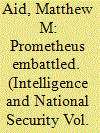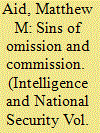|
|
|
Sort Order |
|
|
|
Items / Page
|
|
|
|
|
|
|
| Srl | Item |
| 1 |
ID:
051551


|
|
|
| 2 |
ID:
073524


|
|
|
|
|
| Publication |
2006.
|
| Summary/Abstract |
This paper demonstrates that US-Scandinavian intelligence relations in general, and Signals Intelligence (Sigint) relations in particular, during the period 1945 through 1960 were more extensive and complicated than had previously been believed. Bilateral US intelligence liaison relations with nominally neutral Sweden were of particular importance in the early years of the Cold War given its geographic location adjacent to the northwestern portion of the USSR. Moreover, the importance of Sigint received from the three principal Scandinavian countries covered by this paper (Norway, Denmark, and Sweden) proved to be quite important to the US intelligence community during the early years of the Cold War, when the US Sigint infrastructure was relatively weak and stretched thin by commitments in Asia and elsewhere. This paper covers the quantity, quality, and types of intelligence information provided to the US by each of the Scandinavian nations, demonstrating that the nature of US intelligence relations with these countries changed substantially as time went by.
|
|
|
|
|
|
|
|
|
|
|
|
|
|
|
|
| 3 |
ID:
076354


|
|
|
|
|
| Publication |
2006.
|
| Summary/Abstract |
Five years after the tragic events of September 11, 2001, the National Security Agency (NSA) has risen to the position of being the largest and most powerful intelligence agency in the US. Working in close conjunction with its English-speaking partners overseas, NSA is today the most prolific producer of top-quality intelligence information reaching senior US government policymakers and field commanders. But press reports over the past year concerning the Agency's controversial domestic eavesdropping program and problem-plagued modernization effort, have raised serious questions once again about the competency of the Agency's long-troubled management practices, as well as whether NSA, at the behest of the Bush administration, exceeded its legal authority by extending its operations into the US for the first time since the mid-1970s in contravention of the Foreign Intelligence Surveillance Act (FISA) of 1978.
|
|
|
|
|
|
|
|
|
|
|
|
|
|
|
|
| 4 |
ID:
106324


|
|
|
|
|
| Publication |
2011.
|
| Summary/Abstract |
American intelligence professionals have long understood that the US intelligence community is, and always has been, a closed and insular society, with each agency within the intelligence community taking pride in having its own unique bureaucratic identity, distinct corporate culture, operating environments, social dynamics, and internal behavior patterns that have been molded and shaped by external events and internal forces over the past 60 years. These 'strategic cultural' factors mean that the agencies comprising the US intelligence community are, in many respects, unique bureaucratic entities, operating far differently than comparable large American corporations and government agencies. These strategic cultural factors shape and define the environment within which the US intelligence agency works, dictate how American intelligence agencies perform their mission, and also help to explain why they repeatedly make the same mistakes and find it difficult to fix the longstanding problems which contributed to the failures. Within the context of the recent 9/11 and Iraqi weapons of mass destruction intelligence failures, this article explores the role played by these strategic cultural factors in helping to explain a series of historical intelligence failures by the US intelligence community.
|
|
|
|
|
|
|
|
|
|
|
|
|
|
|
|
|
|
|
|
|